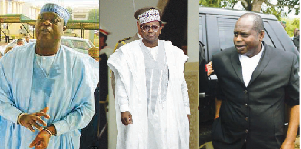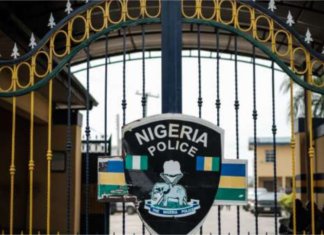The controversy and circumstances under which funds stashed away by the late dictator, Sani Abacha, were recovered and repatriated by the World Bank to then government of Goodluck Jonathan has continued to evoke questions as to how the funds running into billions of naira were managed.
 In order to get to the root of the whole scenario, there is a new report by a civil rights group, the Socio-Economic Rights and Accountability Project (SERAP), which has recommended to the government of President Muhammadu Buhari to “thoroughly investigate the role and involvement of the World Bank in the repatriation, management and spending of repatriated Abacha stolen funds and other similar funds, with a view to ensuring full transparency and accountability in these transactions”.
In order to get to the root of the whole scenario, there is a new report by a civil rights group, the Socio-Economic Rights and Accountability Project (SERAP), which has recommended to the government of President Muhammadu Buhari to “thoroughly investigate the role and involvement of the World Bank in the repatriation, management and spending of repatriated Abacha stolen funds and other similar funds, with a view to ensuring full transparency and accountability in these transactions”.
The 37-page report titled ‘Deterring Kleptocracy: Finding Nigeria’s Re-Stolen Billions and Repatriating Looted Assets’, unveiled in Lagos, SERAP disclosed that over $3 billion recovered Abacha loot; $87 million stolen funds by the former Inspector General of Police (IGP), Tafa Balogun; and over $20 million stolen funds by former governor of Bayelsa State, Diepreye Alamieyeseigha among others, may have disappeared or mismanaged by successive governments. Consequently, it requested the Buhari government to thoroughly investigate the management and spending of the said funds.
The report also demands the World Bank to “publicly disclose its level of involvement in the repatriation of Abacha stolen funds and other similar funds to Nigeria, its role in the management and spending of such funds, as well as the projects on which the funds were spent. The bank should also publicly disclose its other ongoing repatriation initiatives to Nigeria, the mechanisms it is putting in place to ensure transparency and accountability of such mechanisms and the judicious use of repatriated funds.”
It recommends that Buhari’s government should “revisit and challenge in court unfair settlements in bribery cases by successive governments and repatriation agreement between the government of Jonathan and the family of Abacha dated July 14, 2014 and other similar dodgy and unfair agreements, with a view to getting better deals, receiving damages/compensations from companies such as Halliburton, and achieving justice for the Nigerian people.”
Some of the missing funds recovered include $1 billion Swiss government Mutual Legal Assistance, up to 2012; $800 million General Abubakar-led domestic recovery in 1999; $233.8 million Principality of Liechtenstein’s returned funds in June 2014; $198.5 million Ajaokuta Steel Plant debt buy-back case, 2003; $160 million Jersey’s global asset recovery for Nigeria, 2003; and $36,016,200 Jersey’s recovered funds from Mr. Bhojwani in 2012.
Amplifying the report at a special occasion where it was unveiled, SERAP executive director, Adetokunbo Mumuni, said: “President Buhari should make sure that never again will the prerogative of mercy be used to save corrupt officials and grant impunity for corruption as it was done by former President Goodluck Jonathan with respect to corruption cases against Diepreye Alamieyeseigha.
“The constitution imposes some ethical conditions on the president to ensure that the exercise of the discretionary power of prerogative of mercy is not such that it will encourage corruption or provide an escape route for perpetrators.”
He urged the government to consistently utilise the crime of illicit enrichment, also called “unexplained wealth”, “inexplicable wealth” or “disproportionate wealth”, to facilitate recovery of stolen assets by high-ranking officials, stressing that illicit enrichment offence criminalises the “unexplained increase in the wealth of a public official while in office.
“It targets a significant increase in the assets of a public official that he or she cannot reasonably explain in relation to his or her lawful income, essentially deeming a public official’s unexplained accumulation of significant capital to be a form of corruption,” he said.
Other recommendations in the report include vigorous enforcement of laws on financial disclosure requiring government officials to annually disclose and publish information about their income, assets, liabilities and positions held outside public office; establish and maintain a public income and asset declaration database for the president and vice president and senior public officials; establish mechanisms or expand the mandates of the Presidential Advisory Committee against Corruption to include oversight functions over anti-corruption agencies, and, where appropriate, provide necessary framework to make it happen; set up a looted asset fund in the presidency or Ministry of Finance to provide a framework that would allow the appropriate and transparent management of the proceeds of corruption recovered by the government and put in place mechanisms to achieve the effective implementation of the administration of Criminal Justice Act and the UN Convention against Corruption.













